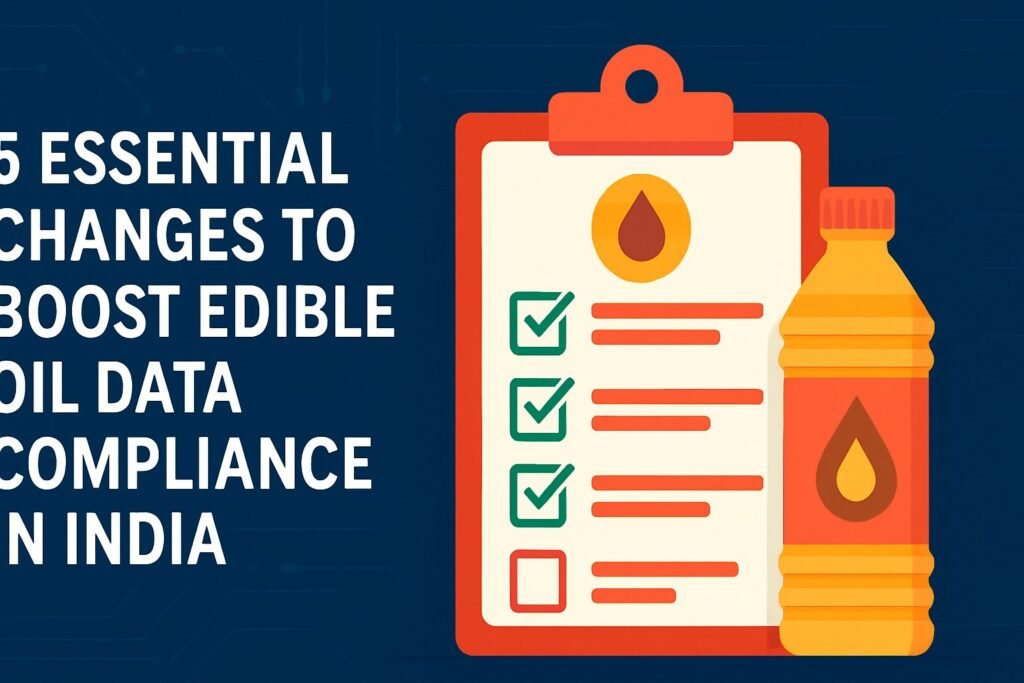In a crucial step to ensure transparency in the edible oil sector, the Government of India has amended the Vegetable Oil Products, Production and Availability (Regulation) Order, 2011. This move aims to enhance edible oil data compliance by strengthening mechanisms for real-time reporting of production, availability, and stock levels.
With edible oil being a key commodity in household consumption and import-heavy in India, accurate and timely data is critical for maintaining price stability and food security.
Why Was the Regulation Amended?
India is one of the largest importers and consumers of edible oils. Due to price volatility in international markets, especially in palm, soybean, and sunflower oil, domestic consumers are often affected.
The original 2011 regulation focused on:
- Monitoring production
- Regulating availability
- Ensuring fair trade practices
However, over time, gaps in data reporting and stock visibility began to impact policy decisions and crisis management during global price shocks.
Hence, the government amended the order in August 2025 to:
- Tighten data compliance mechanisms
- Introduce real-time digital reporting
- Enhance traceability of edible oil from production to retail
What’s New in the Regulation
The amendment introduces mandatory online data submission for all edible oil players. This includes daily and weekly reports on production, imports, sales, and stock levels.
The scope has also been widened. The new rules now apply to all types of edible oils, including blended oils and packaging units.
Authorities can now inspect premises, audit records, and penalize non-compliance. The regulation empowers officials to act swiftly against hoarding or data manipulation.
Better Data, Better Governance
Under the new system, edible oil data compliance will be closely monitored via real-time submissions to a centralized portal. With the integration of this data into national digital platforms like e-NAM and import-export databases, the government will have a real-time view of the entire edible oil ecosystem. This will allow early warnings of shortages, better price monitoring, and smarter policy interventions to stabilize the market.
It also means less room for unethical practices like hoarding or artificial price inflation.
Boost for Edible Oil Data Compliance
This move will significantly improve edible oil data compliance across the supply chain. Accurate, up-to-date data will empower policymakers to act faster and more effectively. For consumers, this means more stable prices. For the industry, it brings a level playing field with consistent data practices. And for the government, it means greater control and insight into one of India’s most sensitive food sectors.
Industry Reactions
The edible oil industry has responded positively to the amendment. Large refiners and manufacturers see this as a move toward greater transparency and efficiency. Smaller processors have asked for support during the transition phase, particularly for adopting digital systems. The government may introduce workshops and training to ease this process.
Alignment With National Goals
This amendment also supports India’s broader goals under schemes like “Digital India”, “Atmanirbhar Bharat”, and the National Mission on Edible Oils – Oil Palm (NMEO–OP). By reducing data gaps, India can plan more effectively to increase domestic oilseed production, reduce import bills, and make the edible oil sector more self-reliant.
The government’s amendment to the 2011 vegetable oil order is a bold and timely step toward building a transparent, well-regulated, and self-reliant edible oil sector. It ensures that data drives decisions—and in a country as large and diverse as India, accurate data is the foundation of food security and price stability. With these changes, the edible oil sector will move toward greater accountability, traceability, and consumer confidence.
Read Also :-
Global Plastic Profiles 2025: The $28 Billion Industry You Never Noticed
Right to Repair in India: Empowering Consumers and Building a Sustainable Future
Bird Deaths and Wind Energy in India: A Silent Crisis in Clean Power
Aadhaar Seeding and Digital Reforms in PM-KISAN Scheme: Empowering Farmers with Direct Support
India’s Spiritual Triumph: Return of the Sacred Piprahwa Relics After 127 Years

